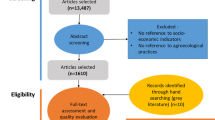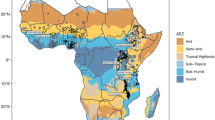Abstract
Tree grower groups have been promoted by governments and development programs worldwide as a means to generate income and improve the livelihoods of smallholders by generating economies of scale and improving their bargaining power. In Luang Prabang province, Lao PDR, three plantation teak grower groups were examined using an action research approach over a 4-year period between 2013 and 2016, with the aim of fostering improved returns to group members. At the beginning of the study, it was observed that despite the existence of a price premium from certification, the unpredictable nature of sales, complex government regulations and the small contribution of teak to total household incomes combined to thwart efforts by the group to sell trees on the regular basis that would make membership worthwhile for growers. An intervention by group members and researchers to develop an internally funded enterprise unit within the group structure which added value to local timber proved to be technically feasible, although it is still too early to judge its sustainability. However, this opportunity did not immediately benefit smallholders since high entry costs, poor technical knowledge and low financial transparency dissuaded group members from buying shares in the enterprise. Improved returns to smallholders will likely occur in time as a result of local enterprises paying higher prices for timber, rather than through active group membership.




Similar content being viewed by others
Notes
Entitled enhancing key elements of the value chains for plantation grown wood in Lao PDR (VALTIP2).
Koperasi Hutan Jaya Lestari, which translates to “cooperative for sustainable successful forests”.
This study was also supported by VALTIP2, and included Xianglom and Ensavanh villages.
There was no support from LPTP or other donors to subsidise capital expenditure.
Equivalent to USD$0.60 cents.
References
Antilla JP (2016) Implications of middlemen in smallholder teak production systems in Northern Lao People’s Democratic Republic (Lao PDR). Master Thesis, Dept. of Forest Sciences, University of Helsinki, Finland
Barr R (2006) Linking small-scale agroforests to international markets for FSC-certified wood: a case study of the cooperative for sustainable successful forests, or ‘KHJL’, Tropical Forest Trust, Indonesia
Baynes J, Herbohn J, Dressler W (2016) Power relationships: their effect on the governance of community forestry in the Philippines. Land Use Policy 54:169–176
Boer K, Seneanachak H (2016) Mapping and characterisation of plantation teak in Luang Prabang Province, Lao PDR. Final Report. Objective 1.1, VALTIP2 FST/2010/012, ACIAR Canberra
Boulay A, Tacconi L, Kanowski P (2012) Drivers of adoption of eucalypt tree farming by smallholders in Thailand. Agrofor Syst 84(2):179–189. https://doi.org/10.1007/s10457-011-9451-y
Bowers T, Eastin I, Ganguly I, Cao J, Seol M (2012) Forest certification in Asia: the changing marketplace for value-added wood product manufacturers in China and Vietnam. For Chron 88(5):578–584
Coghlan D, Brannick T (2001) Doing action research in your own organization, 3rd edn. vol xii, p 170, ISBN 1848602154
Elson D, Unggal S (2016) How Indonesia’s best-known forest cooperative lost its way. Eff For Farm Prod Organ Chapter 3(8):206–212
Folkard A, Virvong B, Connell J, Photakhoun V (2011) Farmer organizations: opportunities, constraints and pathways for development, report for the sub working group on farmers and agribusiness (SWGAB), Vientiane
Food and Agriculture Organisation (1994) The group promoter’s resource book: a practical guide to building rural self-help groups. FAO, Rome
Gill J, Johnson P, Clark M (2010) Action research. In: Research methods for managers, Chap 5, 4th edn. SAGE, London, pp 95–122
Hoang H, Hoshino S, Hashimoto S (2015) Costs comparison between FSC and Non FSC Acacia plantations in Quang Tri Province, Vietnam. Int J Environ Sci Dev. https://doi.org/10.7763/ijesd.2015.v6.727
LPTP (2010) Social study, monitoring and needs assessment, Ban Kok Ngiu village teak farmer’s group. Internal report November 2010
Macqueen D, Bolin A, Greijmans M (eds) (2015) Democratising forest business: a compendium of successful locally controlled forest business organisations. IIED, London
Manalili NM (2013) Trends, patterns and trajectories in brokering small scale farmer engagement with private enterprises in selected countries of Southeast Asia. Published by Asian Farmers’ Association for sustainable rural development (AFA), September 2013
Midgley S, Blyth M, Mounlamai K, Midgley D, Brown A (2007) Towards improving profitability of teak in integrated smallholder farming systems in northern Laos. ACIAR Technical Report 64. Australian Centre for International Agricultural Research, Canberra
Midgley SJ, Stevens PR, Arnold RJ (2017) Hidden assets: Asia’s smallholder wood resources and their contribution to supply chains of commercial wood. Aust For 80(1):10–25. https://doi.org/10.1080/00049158.2017.1280750
Ministry of Industry and Commerce (MOIC) (2015) Decision on wood products no 2005/MOIC.DOIH, Government of Lao PDR
Newby JC, Cramb RA, Sakanphet S, McNamara S (2012) Smallholder teak and agrarian change in Northern Laos. Small Scale For 11(1):27–46. https://doi.org/10.1007/s11842-011-9167-x
Obidzinski K, Dermawan A, Andrianto A, Komarudin H, Hernawan D (2014) Timber legality verification and small-scale forestry enterprises in Indonesia: Lessons learned and policy options, CIFOR Infobrief No. 76, May, 2014, Centre for International Forestry Research (CIFOR), Bogor, Indonesia
Perdana A, Roshetko JM (2015) Survival strategy: traders of smallholder teak in Indonesia. Int For Rev 17(4):461–468. https://doi.org/10.1505/146554815817476477
Perdana A, Roshetko JM, Kurniawan I (2012) Forces of competition: smallholding teak producers in Indonesia. Int For Rev 14(2):238–248. https://doi.org/10.1505/146554812800923417
Prime Minister’s Office Lao PDR (PMO Lao PDR) (2016). Prime Minister’s Order on strengthening strictness of timber harvest management and inspection, timber transport and business no 15/PMO 2016. Government of Lao PDR
Prime Minister’s Office Vietnam (PMO Vietnam) (2006) Decision No. 186/2006/QD-TTg dated August 14, 2006, promulgating the regulation on forest management. Article 40, Government of Vietnam
Race D, Wettenhall G (2016) Adding value to the farmer’s forest: experiences of community-based commercial forestry in Indonesia. Australian Centre for International Agricultural Research (ACIAR), Canberra. http://aciar.gov.au/files/farmerstrees_final_print_version_-_8_june_2016.pdf
Rigg J, Salamanca A, Thompson EC (2016) The puzzle of East and Southeast Asia’s persistent smallholder. J Rural Stud 43:118–133. https://doi.org/10.1016/j.jrurstud.2015.11.003
Rohadi D, Roshetko JM, Perdana A, Blyth M, Nuryartono N, Kusumowardani N, Pramono AA, Widyani N, Fauzi A, Sasono J, Sumardamto P, Manalu P (2012) Improving economic outcomes for smallholders growing teak in agroforestry systems in Indonesia. Australian Centre for International Agricultural Research (ACIAR), Canberra
Roshetko JM, Rohadi D, Perdana A, Sabastian G, Nuryartono N, Pramono AA, Widyani N, Manalu P, Fauzi MA, Sumardamto P, Kusumowardhani N (2013) Teak agroforestry systems for livelihood enhancement, industrial timber production, and environmental rehabilitation. For Trees Livelihoods 22(4):241–256. https://doi.org/10.1080/14728028.2013.855150
Said A (2016) Transaction costs associated with growing and selling smallholder plantation grown wood in Lao PDR—incidence and mitigations. Final report. Objective 1.2b, VALTIP2 FST/2010/012, ACIAR Canberra
Smith HF, Ling S, Boer K (2017) Teak plantation smallholders in Lao PDR: What influences compliance with plantation regulations? Aust For. https://doi.org/10.1080/00049158.2017.1321520
Warr PG, Rasphone S, Menon J (2015) Two decades of rising inequality and declining poverty in the Lao People’s Democratic Republic. ADB economics working paper series No. 461, November, 2015. http://hdl.handle.net/11540/5253
Acknowledgements
This work was funded by the Australian Centre for International Agricultural Research (ACIAR) Project FST-2010-012. We gratefully acknowledge the contribution of the Project’s research partners in Luang Prabang, especially Bounchanh Lattanavongkot and Sichan Chandipith of the Luang Prabang Teak Program, and Sengkham Phonchaluen of Souphanouvong University. The time and assistance of those growers who joined with us in the action research is appreciated. Finally, we express our thanks to two anonymous reviewers who contributed greatly to the improvement of the original manuscript.
Author information
Authors and Affiliations
Corresponding author
Rights and permissions
About this article
Cite this article
Ling, S., Smith, H., Xaysavongsa, L. et al. The Evolution of Certified Teak Grower Groups in Luang Prabang, Lao PDR: An Action Research Approach. Small-scale Forestry 17, 343–360 (2018). https://doi.org/10.1007/s11842-018-9391-8
Accepted:
Published:
Issue Date:
DOI: https://doi.org/10.1007/s11842-018-9391-8




